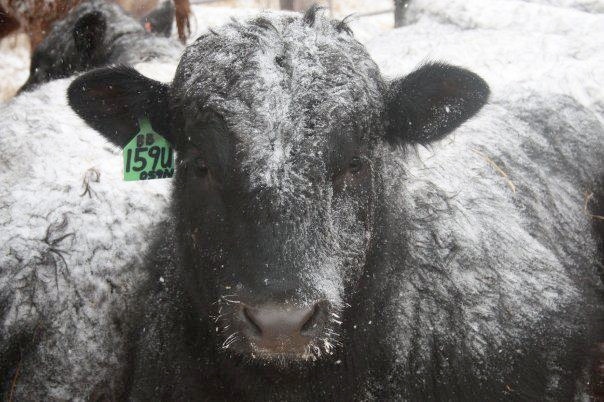Protect your bull battery with extra care during the cold winter months.
January 18, 2021

Bull sale season is upon us, and it’s very likely that your email inbox and mailbox are stuffed full of catalogs, upcoming sale information and advertisements for the next generation of genetics that will impact your breeding program.
And while you sift through this avalanche of information and prepare to attend bull sales and make purchases to meet your production goals for the years ahead, now is also n important time to ensure you are also managing your bull investments well at home on the ranch.
Being in the seedstock bull business myself, we always encourage our customers to take extra care for their yearling, two-year old and mature bulls to help them weather through brutal winter weather and maintain their body condition scores leading up to the breeding season.
As you head to these sales and invest your dollars in your bull battery, keep these tips in mind from Kacie McCarthy, University of Nebraska-Lincoln cow-calf specialist.
On bull nutrition, McCarthy writes, “Bulls will often lose anywhere from 100 to 400 pounds during the breeding season. Therefore, monitoring body condition during and after the breeding season will help you know where your bulls are at and how to prepare for weight gain in the off season. Furthermore, once bulls come out of the breeding season, proper nutrition and development still exists after the breeding season. This is especially important for our young bulls that are still growing. For yearling bulls, it will be critical to gain back weight lost during the breeding season and ensure that they continue to gain weight prior to their next breeding season.
“Similar to maintaining body condition score (BCS) of the cowherd, bulls should be in an adequate BCS of 5 to 6 as we move into and through winter, which allows for greater BCS and potentially semen quality in the subsequent breeding season. Research has shown that bulls in a BCS of 5 to 6 have better semen quality than those in a 4 or 7.”
Additionally, don’t forget a good vitamin and mineral program to optimize animal performance and breeding success.
McCarthy writes, “Some important minerals to consider include, selenium (Se), which plays a key role in spermatogenesis, as well as zinc (Zn), which also plays a role in male fertility, and is critical for sperm cell plasma membrane integrity. In addition, iodine (I) can be added to alleviate any foot rot issues. As you develop rations, or need help from your local extension personnel, including a quality vitamin and mineral program will be important to consider.”
On cold weather management, “With cold weather approaching, ensuring that our bulls have appropriate housing/shelter, bedding, and feed to progress through the winter will be key for future success in the spring. Bulls need appropriate housing to provide protection during severe cold weather, which can lead to fertility problems.”
On preparing for the next breeding season, “Following winter, it will be important to make sure we think about scheduling a breeding soundness exam (BSE) at least 60 days prior to the start of the breeding season. If there has been an insult (i.e., frostbite) occurring between the end of last year’s breeding season and the start of the next, it will take at least 60 days to recover and make new sperm. The 60-day benchmark gives bulls time to recover and recheck (usually 2 to 4 weeks later) will guarantee he won’t be impacting the new breeding season, or gives you time to find another bull.”
To read the entire article click here.
In closing, as we prepare to purchase bulls for the upcoming breeding season, also be sure to reference BEEF’s wealth of tools and materials to assist you in acquiring genetics and taking care of those investments. A few articles you may enjoy include:
The opinions of Amanda Radke are not necessarily those of beefmagazine.com or Farm Progress.
About the Author(s)
You May Also Like





